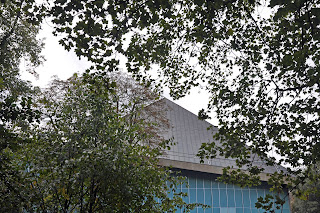I have always loved this building, perched, as it is, on the edge of Holland Park (which also happens to be one of my favourite places in our City). My first visit to the Institute was as part of a school group, unsurprising really as my school was only about 10 minutes walk away, but I went several times after, either on my own or with friends.
In many ways, it was a dry and dusty place, full of the sort of stuff that, if it were in the Science Museum or the Natural History Museum, you would hurry past on the way to something more exciting. The production of cocoa or sugar cane not being the most interesting thing to a teenage boy! I think, perhaps, that I would get more from the exhibits now than I did then. However, although I probably didn’t understand why at the time, the building was fascinating. Details of its design and construction have been well covered elsewhere, so I will just say that it seemed to be more like the set of a James Bond film than a museum……and that roof was just something else!
Opened by the Queen on the 6th November 1962, it gave sterling service promoting the Commonwealth and providing educational services to thousands of school children. It was closed, suddenly and controversially in 2002. Since then the building has had a very rocky ride, with a whole string of proposals and objections and all the time deteriorating year by year.
Now, it has a future, it’s not a future that pleases everyone but then what would. The exterior is Grade 11* listed and is regarded by English Heritage as the second most important modern building in London (after the Royal Festival Hall) but the listing does not follow through to the interior. Design Museum representatives were a little cagey about the planned changes to the inside but I’m pretty sure that we can assume they’ll be extensive.
I think that we have to be practical here. It is currently a wonderful space and it will be a great shame to lose it, but it was originally designed for a specific purpose and that purpose has now passed. To make it useable, and the future of the building is entirely dependant on it being useable, change has to be accepted. We can only hope that those changes are as sympathetic as possible.
Did I mention the flagpoles? They’ve been a feature of that part of Kensington High Street for so long. Visible even when the Institute is largely hidden by the trees. Whatever happens to the rest of the building, I hope they keep the flagpoles. They look fantastic…….even without the flags!







No comments:
Post a Comment